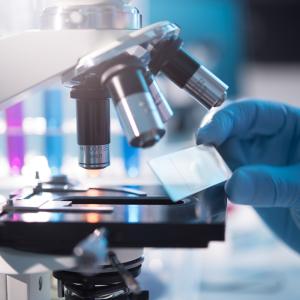
By looking at every aspect of a person, our doctors are able to make care plans that take physical, social, and emotional needs into account.
Credit: Getty/CreativeDesignArt
Breast cancer can impact many aspects of your health, and how you live your life. While everyone’s experience with the disease is unique, it’s comforting to know your care team supports your overall health and wellbeing. That’s the benefit of a holistic treatment approach.
“Beyond treating the cancer, we are attentive to who you are as a person,” explains breast cancer oncologist Elizabeth Comen, MD, who is with the Breast Cancer Center at NYU Langone Health’s Perlmutter Cancer Center. “It requires a conversation about what things make you feel like you, and what you value in life,” she says. Only then can our clinicians tailor a treatment plan that aligns with your physical, social, and emotional needs.
We connect patients to doctors and services across our integrated network, providing access to exceptional care no matter what your needs and preferences may be.
Here are three core benefits of our whole-person approach to breast cancer.
Preserving Fertility After a Breast Cancer Diagnosis
Some breast cancer treatments impact fertility. And with the rate of breast cancer on the rise in women under age 50, it’s important to connect with experts who can help assess your risk and provide counseling and services.
Gynecologic oncologist Emeline M. Aviki, MD, MBA, created Perlmutter Cancer Center’s Onco-Fertility Program to assist people of child-bearing age who are having cancer treatment and want to preserve their fertility.
The program’s nurse navigators understand the nuances associated with each type and stage of breast cancer. They provide counseling and help coordinate fertility procedures with chemotherapy, radiation, or surgery, “so you have someone who’s quarterbacking the whole process,” Dr. Aviki explains.
Depending on your age and desire to have children in the future, you may be referred to a reproductive endocrinologist to have egg retrieval. You may also receive injections of a hormone-suppressing drug to protect your ovaries during chemotherapy.
“It’s really important to give women the choice to preserve their fertility, to know that cancer didn’t take that decision away from them, so that there are no regrets down the road,” Dr. Aviki notes.
Protecting Your Heart After a Breast Cancer Diagnosis
“When you have breast cancer, the last thing you want to hear is that your heart is also at risk,” says Michelle Bloom, MD, director of the Cardio-Oncology Program at NYU Langone.
But some breast cancer treatments can affect your heart, so a proactive approach can improve your long-term survival.
“I see myself as a cheerleader on the sidelines and an advocate for your heart health, so that you and your oncologist can focus on the best way to beat breast cancer,” says Dr. Bloom.
A cardio-oncologist goes over your risk factors, orders blood work and imaging, and lays out a plan for managing your heart health before, during, and after treatment.
If heart symptoms arise, your cardio-oncologist works collaboratively with your oncologist to figure out what’s going on and coordinate your care. If you need to see other NYU Langone specialists for cancer-related side effects, your doctor can expedite those referrals through the Symptom Management Program at Perlmutter Cancer Center at NYU Langone Hospital—Long Island.
“Women tend to ignore their symptoms because they’re taking care of the world,” says Dr. Bloom. “If something doesn’t feel right, if they have shortness of breath, nausea, chest discomfort, or feel like their bra is too tight, these can be signs of heart disease, and they need to get checked out.”
Accessing Services and Support as a Breast Cancer Survivor
The Survivorship Program at Perlmutter Cancer Center is all about quality of life. It addresses a wide range of the physical, social, and emotional needs, whether it be exercise, online meditation, nutrition counseling, or referrals to specialists throughout the system.
“We think of survivorship as something that starts from the day of diagnosis onwards, really helping patients to live their best lives,” says program director and medical oncologist Marleen I. Meyers, MD. “We are very hands-on and holistic; we ask questions early on, and we intervene early on.”
A woman who develops neuropathy during chemotherapy, for example, may see our experts at Rusk Rehabilitation for cancer rehabilitation. If fear of cancer recurrence after treatment is an issue, our oncology social workers, psychologists, and psychiatrists are available to help. To ease the physical and psychological effects of the disease, we offer free CancerFIT exercise classes.
Patients should never assume that nothing can be done to ease their physical side effects or emotional distress, says Dr. Meyers. Always discuss these issues with your provider. “Cancer does change a person’s life, physically, psychologically, and socially,” she says, “but your quality of life can still be quite excellent.”

